#GetPlaying – The benefits of music
Whether you sing, play an instrument, create or enjoy listening to music, evidence shows that engaging with music from a young age has many benefits. Plus, it's great fun!
Music is great fun, but did you know it can also improve brain function, support well-being, and broaden horizons? Here are 10 benefits about music you may not have known about...
Music makes you smile
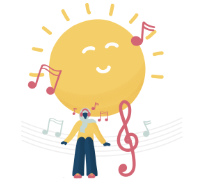 Learning to sing or play an instrument has long been found to boost self-esteem and enhance wellbeing, particularly in children. Just listening to music can trigger a release of dopamine – a ‘feel-good’ chemical – to the brain, so it’s no wonder that making music can have a powerful effect on mood.
Learning to sing or play an instrument has long been found to boost self-esteem and enhance wellbeing, particularly in children. Just listening to music can trigger a release of dopamine – a ‘feel-good’ chemical – to the brain, so it’s no wonder that making music can have a powerful effect on mood.
Music is good for your brain
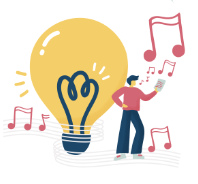 Do you forget every password you come up with but easily remember the lyrics to whole songs? That’s because music helps with working memory. While listening to music engages many parts of the brain, making music uses and strengthens practically every single area at once.
Do you forget every password you come up with but easily remember the lyrics to whole songs? That’s because music helps with working memory. While listening to music engages many parts of the brain, making music uses and strengthens practically every single area at once.
In children, music can even accelerate and strengthen the development of areas of the brain responsible for processing sound, language development, speech perception and reading skills.
Watch Anita Collins show how this works in just four minutes!
Music helps you connect
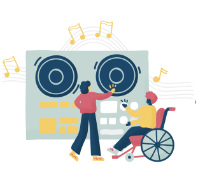 Music has human expression and connection at its core and making music as part of the group has been proven to help social cohesion and collaboration. But equally importantly, it’s really fun!
Music has human expression and connection at its core and making music as part of the group has been proven to help social cohesion and collaboration. But equally importantly, it’s really fun!
When you’re part of a group, you can achieve things you couldn’t do alone. Children can experience this great feeling when they join a music group, ensemble or choir.
Music has academic benefits
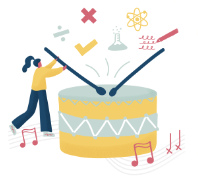 Music can be an effective way of engaging with SEND pupils and developing the language skills of EAL learners. As well as this, some research has shown a positive relationship between music-making and performance in other subjects.
Music can be an effective way of engaging with SEND pupils and developing the language skills of EAL learners. As well as this, some research has shown a positive relationship between music-making and performance in other subjects.
Often, adults will find they can remember entire songs they learned at school, even in another language. Music can be a powerful tool in the classroom to aid learning in other subjects.
Music opens a door to a whole world
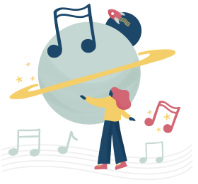 The music industry is vibrant and full of opportunities. In fact, pre-pandemic the UK Music Industry employed over 197,000 people, and each year the UK listens to an estimated 60 billion hours of music!
The music industry is vibrant and full of opportunities. In fact, pre-pandemic the UK Music Industry employed over 197,000 people, and each year the UK listens to an estimated 60 billion hours of music!
From travelling and performing, to teaching, producing and managing artists, the music industry is just one place where music can take you.
There are lots of ways to be musical
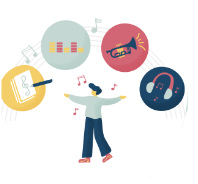 There are many ways to be a musician, and it doesn’t always mean playing an instrument. Youth Music's research report ‘The Sound of the Next Generation’ found that young people named over 300 genres when asked about their musical tastes.
There are many ways to be a musician, and it doesn’t always mean playing an instrument. Youth Music's research report ‘The Sound of the Next Generation’ found that young people named over 300 genres when asked about their musical tastes.
The report also found that whilst 30% of young people play an instrument, 67% of young people make music, which includes singing, rapping, DJing, making music on a computer, karaoke, and writing music.
You don't need to spend much to get started
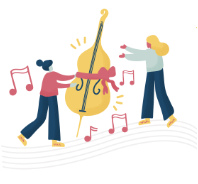 Some of the most affordable instruments, like recorders and ocarinas, are also the most versatile, capable of playing complex melodies.
Some of the most affordable instruments, like recorders and ocarinas, are also the most versatile, capable of playing complex melodies.
Take a look at Charlotte Barbour Condini playing the recorder in the BBC Young Musicians of the Year finals.
You don't need to be an expert to help your child learn
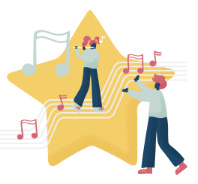 It doesn’t matter if you never learned to sing or play an instrument yourself – encouragement and patience goes a long way at supporting musical progression.
It doesn’t matter if you never learned to sing or play an instrument yourself – encouragement and patience goes a long way at supporting musical progression.
Music Mark Champion Dr Kadiatu Kanneh-Mason and her husband Stuart are not professional musicians themselves, but have raised seven children who all study and perform music to a very high level, with their son Sheku even winning BBC Young Musician of the Year.
Dr Kanneh Mason said herself that “music learning for children is about joy, celebration, sharing, and love, and is a fascinating journey for parents to make with their children.”
Music is for life
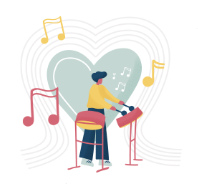 An early start in music often results in music becoming a life-long passion. While not all learners go on to play in professional orchestras or famous rock bands, the skills acquired from learning music are used everyday.
An early start in music often results in music becoming a life-long passion. While not all learners go on to play in professional orchestras or famous rock bands, the skills acquired from learning music are used everyday.
More importantly, the joy in playing, listening, and enjoying music for its own sake can last a lifetime.
Studies carried out with instrumental and vocal groups have shown how music-making contributes to positive wellbeing and a sense of community in participants of all ages, as well as developing musical skills and enjoyment.
Music is rewarding
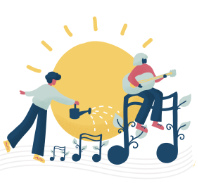 Rapper Little Simz went from performing freestyles to her friends at youth club aged 9, to winning a BRIT award in 2022. Ed Sheeran – now one of the world’s best-selling music artists – began his career busking in the streets and playing guitar from a young age.
Rapper Little Simz went from performing freestyles to her friends at youth club aged 9, to winning a BRIT award in 2022. Ed Sheeran – now one of the world’s best-selling music artists – began his career busking in the streets and playing guitar from a young age.
Everyone’s journey has to start somewhere, but with time, patience, and hard work, it’s rewarding to see musical skills improve.
With thanks to...
#GetPlaying is a UK-wide initiative by Music Mark, with graphics and artwork by Esther Shelley.